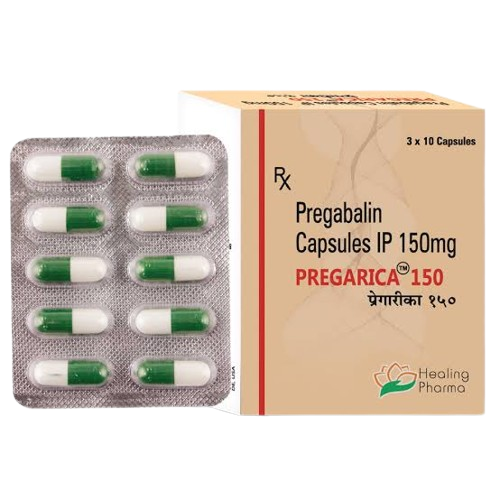Description
Pregabalin 150 mg Capsules – Neuropathic Pain & Nerve Relief
Pregabalin 150 mg is an anticonvulsant and nerve pain medication used to manage neuropathic pain, fibromyalgia, epilepsy, and generalized anxiety disorder (GAD). It works by calming overactive nerves in the brain and spinal cord, helping reduce pain, seizures, and anxiety symptoms.
Key Benefits:
- Provides effective relief from nerve pain (diabetic neuropathy, post-herpetic neuralgia)
- Helps prevent partial seizures in epilepsy patients
- Reduces symptoms of generalized anxiety disorder
- Improves sleep and overall quality of life
- Generic alternative to Lyrica® – cost-effective and reliable
How to Use:
Take one capsule (150 mg) once or twice daily, as prescribed by your doctor. It may be taken with or without food. Do not stop suddenly — tapering is required to avoid withdrawal symptoms.
Common Conditions Treated:
- Diabetic neuropathy
- Postherpetic neuralgia (nerve pain after shingles)
- Fibromyalgia
- Focal (partial) seizures (as adjunct therapy)
- Generalized anxiety disorder (GAD)
Precautions:
- May cause dizziness, drowsiness, or blurred vision — avoid driving
- Inform your doctor if you have kidney problems or are pregnant
- Not recommended for use in children under 18 without medical advice
- Avoid alcohol while taking Pregabalin
- Gradual dose reduction is necessary to discontinue safely
Storage Instructions:
Store below 25°C in a dry place. Protect from heat and moisture. Keep out of reach of children.
Frequently Asked Questions (FAQs)
1. What is Pregabalin 150 mg used for?
It is used to treat nerve pain, seizures, and anxiety disorders. It’s particularly effective in diabetic neuropathy, fibromyalgia, and post-herpetic neuralgia.
2. Is Pregabalin addictive?
Pregabalin has a low risk of dependence. However, long-term use may lead to tolerance or withdrawal symptoms if stopped abruptly.
3. How long does Pregabalin take to work?
Relief from nerve pain may begin within a few days, while seizure and anxiety control may take 1–2 weeks of consistent use.
4. Can I stop taking Pregabalin suddenly?
No. Stopping abruptly may cause withdrawal symptoms. Always follow your doctor’s tapering schedule when discontinuing.
5. Are there side effects?
Yes. Common side effects include dizziness, sleepiness, dry mouth, blurred vision, and weight gain. Serious side effects are rare but require medical attention.
6. Is it safe with alcohol?
No. Combining Pregabalin with alcohol may increase sedation and dizziness, impairing your ability to function safely.
7. Can Pregabalin be used for anxiety?
Yes. It is approved in some countries for the treatment of Generalized Anxiety Disorder (GAD), particularly when other medications are not effective.



